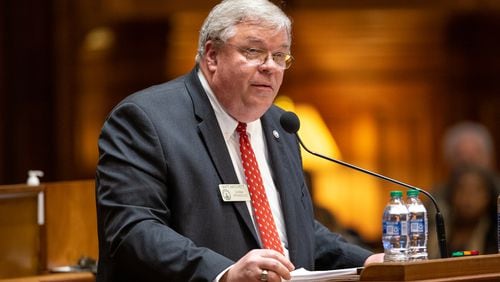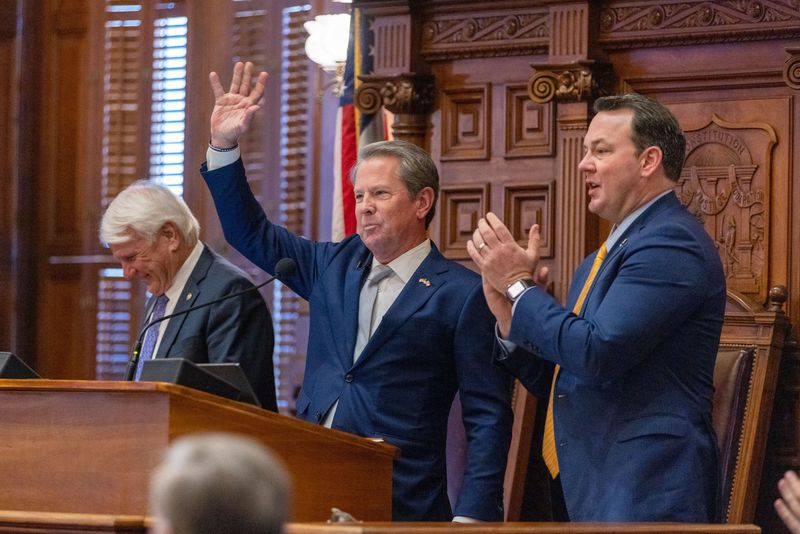With the state sitting on a mountain of reserves, Georgia House leaders on Tuesday backed a midyear budget that adds $5 billion in spending, including money for a new medical school at the University of Georgia, roads, rural airports, local water and sewer projects, and rural economic development programs.
The House Appropriations Committee backed most of the spending hikes Gov. Brian Kemp proposed in January, despite the fact that state tax collections have been slow for much of the past year and are not projected to improve anytime soon.
But with $16 billion in “rainy day” and undesignated reserves, Kemp and lawmakers see the midyear budget — which runs through June 30 — as a chance to allocate money for big construction and infrastructure projects that will both better prepare the state for the future and put more Georgians to work.
“We’ve got some really good stuff in this budget,” said House Appropriations Chairman Matt Hatchett, R-Dublin. “There are many areas where we agree with the governor on the budget.”
Tax collections were slow for most of 2023 after three years of skyrocketing growth, which allowed the state to build up those reserves.
That matters because the money the state collects in taxes helps pay for K-12 schools, colleges, public health care, prisons, policing, business regulation, roads and a host of other services.
The state spent about $26.6 billion — excluding federal funding — in fiscal 2020, the last budget plan approved before the COVID-19 pandemic hit. Last year, it was more than $32 billion, and the midyear plan would spend $37.5 billion for fiscal 2024. Of that, $2 billion would come out of “undesignated” reserves.
Unlike in most years, the state would pay in cash for new college buildings, agency facilities and maintenance programs it typically borrows money to provide. That will save the state $1.3 billion in borrowing costs over 20 years, according to Kemp administration projections.
The budget covers a range of major infrastructure and education projects, including a new medical school at UGA, a new dental school at Georgia Southern University, large-scale computer system upgrades, more money for sewer improvements and massive road-building spending. The state would spend an additional $1.5 billion alone on road building and maintenance.
The state would also spend $35 million on renovations at the Atlanta Farmers Market, and $450 million would go for a new state-of-the-art prison in Washington County as well.
While prisons are being updated, the House version of the budget would spend $5 million more to house inmates in private prisons. It also calls for spending $9.8 million for security technology at some of the state’s most dangerous prisons to block illegal cellphone use by inmates, a major issue for the Department of Corrections.
The House included Kemp’s proposal to include the $315 million he has already spent giving $1,000 retention bonuses to more than 300,000 teachers, school workers and state agency staffers. The governor announced the bonuses shortly before Christmas.
Credit: TNS
Credit: TNS
They went along with Kemp’s proposal to restore $66 million in spending cuts to the University System of Georgia — which he opposed when lawmakers made the reduction late in the 2023 session.
The midyear budget passed by the House panel includes $29.25 million for public safety and infrastructure costs related to the 2026 FIFA World Cup and 2025 College Football Playoff National Championship events in Atlanta.
The General Assembly is run by rural lawmakers, and so Kemp and the House included big money for projects there as well.
The budget would put $100 million into supporting rural economic development projects and expanding grant opportunities for rural site development. The House added $27 million for aid to small-town airports, another favorite program for rural legislators.
The panel went along with Kemp’s proposal to spend $500 million propping up the state’s pension system for retired state workers. Hatchett said he hopes that will mean in the future a return to providing cost-of-living increases for retirees, something they have rarely received since 2008.
The committee added $2 million to help pay for the construction of the Anne Frank Education Center, with an additional $4 million coming from private sources. The move comes less than a week after Kemp signed into law a bill with new protections against antisemitism.
In some cases, the House put money back in the budget that Kemp cut out in May. For instance, the House added $315,000 to provide sexual assault nurse examiner coordinators at all state-funded sexual assault centers that don’t have one.
The SANE positions are used to schedule and manage nurses who perform forensic medical exams and collect evidence. In some cases, the coordinators also perform forensic medical exams, especially since there is a shortage of nurses to do the work statewide.
Rep. Bill Hitchens, R-Rincon, former head of the Georgia State Patrol, said many sexual assaults are the work of serial rapists.
“If we don’t get the evidence and don’t put these people away, they will continue to cause problems in our society,” said Hitchens, who heads the House budget subcommittee on public safety that recommended the SANE position funding.
Money for those positions was essentially pulled by Kemp last year, along with dozens of other spending items after he warned lawmakers that a recession loomed.
The full House is expected to pass the measure Wednesday, and then it moves to the Senate for its consideration.
Capitol Recap: The 2024 Legislative Session
Want to know what legislators did this past week and how it might affect you? Check out our weekly newsletter, Capitol Recap: The 2024 Legislative Session, every Friday.
To subscribe, go to https://www.ajc.com/subscribe-2024-legislative-session/.
About the Author









